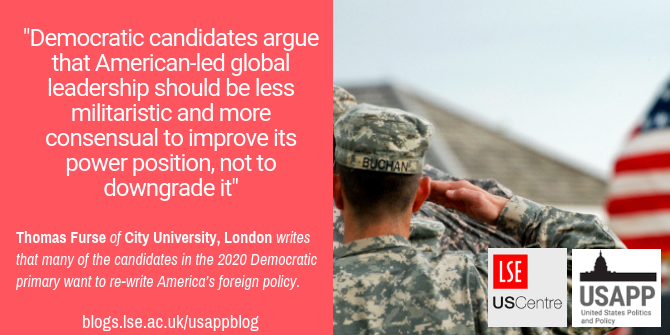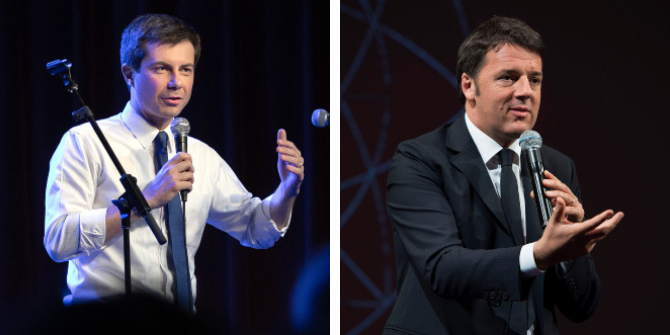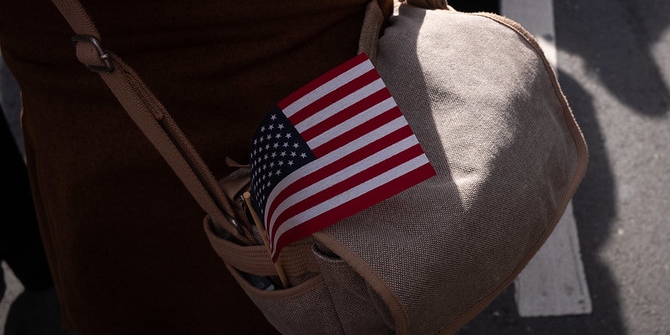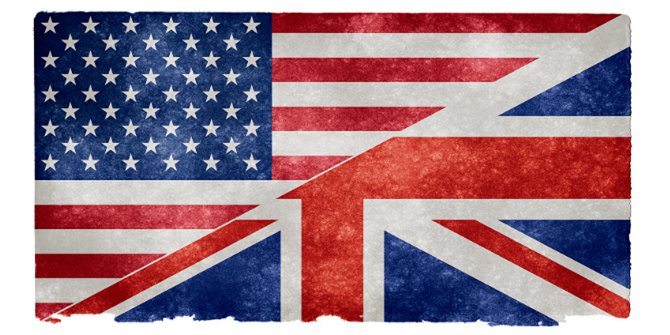 Since the early 1990s, US foreign policy has largely centered on promoting and preserving – often via military interventions – the rules-based order of democracy and free-trade across the world. Thomas Furse writes that many candidates in the Democratic Party’s 2020 primary field advocate that the US pursues a more restrained foreign policy – one that emphasizes consent, not militarism.
Since the early 1990s, US foreign policy has largely centered on promoting and preserving – often via military interventions – the rules-based order of democracy and free-trade across the world. Thomas Furse writes that many candidates in the Democratic Party’s 2020 primary field advocate that the US pursues a more restrained foreign policy – one that emphasizes consent, not militarism.
- This article is part of our Primary Primers series curated by Rob Ledger (Frankfurt Goethe University) and Peter Finn (Kingston University). Ahead of the 2020 election, this series explores key themes, ideas, concepts, procedures and events that shape, affect and define the US presidential primary process. If you are interested in contributing to the series contact Rob Ledger (ledger@em.uni-frankfurt.de) or Peter Finn (p.finn@kingston.ac.uk).
Criticism of America’s foreign policy is becoming a defining trait of 2020 Democratic Primary candidates. They have soundly rejected Donald Trump’s brashness, his anti-immigration policies and his apparent shallow knowledge of foreign affairs. Nevertheless, they are positioning themselves with policies similar to those argued for by Trump and, to a lesser extent, Bernie Sanders in 2016; withdrawal of troops and renegotiating free trade deals. These ideas grabbed voters’ interest then and now the political debate has shifted. No Democratic candidate is arguing unabashedly in favor of major troop deployment and free trade.
This Liberal Hegemony—the promotion of the rules-based order, US-led military interventions, democracy and free trade around the world—has been the dominant ideology of US foreign policymakers since the end of the Cold War. John Ikenberry, a leading proponent, argues that the US as a liberal hegemon, seeks “to lead or manage the global system of rules and institutions” (2004, p. 624). These lofty aims, always partially realized, and their militarized means have turned the 2020 Democratic Primary candidates to look at other possibilities, just as Trump has tried to do. Despite this, Democratic criticism of the endless wars and free trade is not a sign that the US is withdrawing from global leadership.
Obama in Syria and the crisis in Venezuela
President Obama was a moderate harbinger for the Democratic anti-interventionist cause, criticizing the poorly-planned and expensive Iraq war, while supporting the war in Afghanistan. As president, he deliberated extensively over the merits and costs of the big 2009 troop surge in that country. This deliberation over an American-led war was concurrent with the usage of drones rather than troops, and his ‘leading from behind’ strategy in Libya, which attempted to frame the conflict as more of a European problem.
Obama’s strategy to avoid further engagement in Syria has been continued by other Democrats. New Jersey Senator Cory Booker criticized the international legal basis for keeping American troops there after the war against ISIS had ended; America shouldn’t break international law for the war, he has argued. Other candidates have piled on. Kirsten Gillibrand, who was supportive of airstrikes in Libya, turned against their use in Syria after the 2017 chemical weapon attacks, stating that “there is no ‘military only’ solution to the suffering in Syria.” California Senator, Kamala Harris sought more Congressional oversight over any US military action and has promoted a more open-door immigration policy for Syrian refugees. Tulsi Gabbard, the US House member from Hawaii, has gone further with anti-interventionism, meeting Syrian leader Bashar al-Assad in 2017 and recently arguing that American foreign policy needs to meet with “friends or adversaries or potential adversaries if we are serious about the pursuit of peace and securing our country.”
Even in the Western Hemisphere, which has long been regarded as an American sphere of influence, the 2020 Democratic candidates haven’t aired Liberal Hegemony’s signature interventionism. Vermont Senator Bernie Sanders, whose foreign policy was thinly articulated in 2016, openly condemned Maduro’s government of Venezuela, and said that the United States “must learn the lessons of the past and not be in the business of regime change or supporting coups… we must not go down that road again.”
Kamala Harris doesn’t support US military intervention either and has voiced the need to change immigration policy to allow more Venezuelans access to the United States. Beto O’Rourke, the latest 2020 candidate, has argued against U.S. troop deployment there as well citing the instability that comes from interventions. Gillibrand and Warren didn’t shy away from calling Maduro a dictator, but haven’t backed a military solution. Their conception of American leadership is of that isn’t tied to the military, and instead relies on moral condemnation and allowing the Syrians or Venezuelans to settle in the United States. Recent Democratic votes on the Saudi-Yemen war shows what the morality of American leadership can look like: offshore, restrained and with a moral purpose.

“Departure Ceremony” by The U.S. Army is licensed under CC BY 2.0
Restraint against Liberal Hegemony
In The Great Delusion, the restraint advocate, John Mearsheimer argues that Liberal Hegemony is an elite-driven ideology at odds with the more nationalist public (2018, p. 129). Stephen Walt, meanwhile, posits that Trump’s embrace of America First appealed the public who were tired of the US as the “indispensable nation” (2018, p. 5-6). By acknowledging the elitism of Liberal Hegemony, the 2020 candidates are recognizing the value of anti-elitist populist narratives from 2016.
This foreign policy restraint is a strategic response to a distorted militarized foreign policy. Warren argues that fighting international terrorism for 17 years, “has dangerously distorted US policies” and “distracted Washington from growing dangers in other parts of the world: a long-term struggle for power in Asia, a revanchist Russia that threatens Europe, and looming unrest in the Western Hemisphere.” This isn’t America withdrawing. “Having a strong military doesn’t mean we need to constantly use it,” Warren argues “An effective deterrent also means showing the good judgment to exercise appropriate restraint.”
Realists have long made the case for foreign policy restraint. In the heady days of the early 2000s, many of its advocates saw their political direction dismissed as unrealistic by liberal internationalists and neoconservatives, who argued more effective narratives prior to interventions. Restraint means that troops are withdrawn from Eurasia and Africa, joint military exercises are reduced, allies take a bigger role in their interventions and America declines to initiate airstrikes. This is the politics of Trump and Sanders, not Hillary Clinton. Restraint advocates have repeatedly questioned the utility of NATO, too; in a Foreign Affairs article, Elizabeth Warren did not mention the alliance once.
Democratic disillusion with the military
This isn’t the first time the Democrats have been anti-war. When the Vietnam War ended in 1975, the party’s base was deeply skeptical of interventions. In the 1980s Ronald Reagan changed the debate, proclaiming the need to get over the ‘Vietnam syndrome,’ the view that the American military fails abroad, and to double-down on battling communism and the Soviet Union. This posture proved popular. Bill Clinton hosted the Democratic Party’s shift to a more interventionist position in 1992. American backed regime change-NATO interventions in the former Yugoslavia made many liberals into hawks—and sanctioning kleptocrats became a liberal goal.
This era is over for the 2020 candidates. Insecurity stemming from Iraq, Afghanistan, Syria and Yemen and its domestic political fallout elicited a philosophical and strategic change that Obama and Trump observed to some degree. For many Democratic candidates now, military restraint doesn’t equate to isolationism; only Gabbard and Sanders seem particularly skeptical of the idea of American leadership. Rather, the Democratic candidates argue that American-led global leadership should be less militaristic and more consensual to improve its power position, not to downgrade it.
Please read our comments policy before commenting
Note: This article gives the views of the author, and not the position of USAPP– American Politics and Policy, nor of the London School of Economics.
Shortened URL for this post: http://bit.ly/2W51WZm
About the author
 Thomas Furse – City University, London
Thomas Furse – City University, London
Thomas Furse is a PhD candidate at City University, London, researching conservative and radical right discourses in US foreign policy from 2008-2020.






